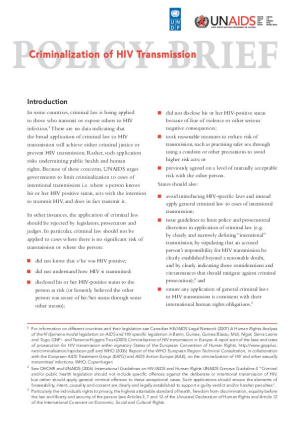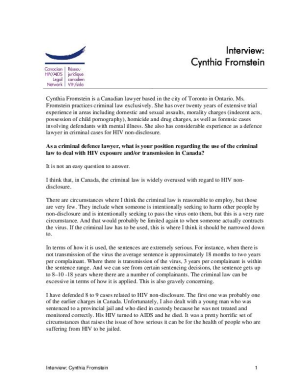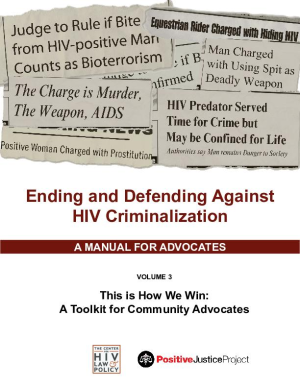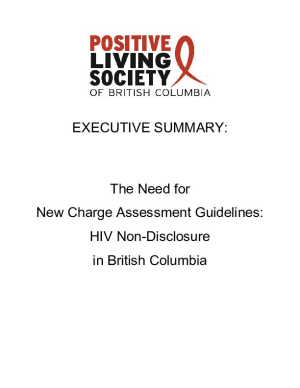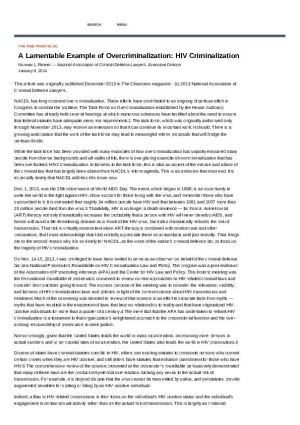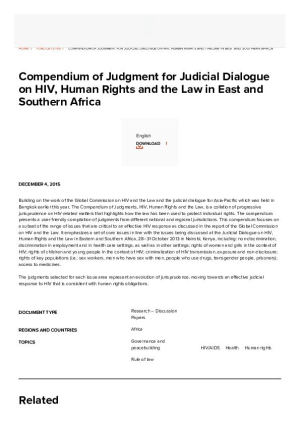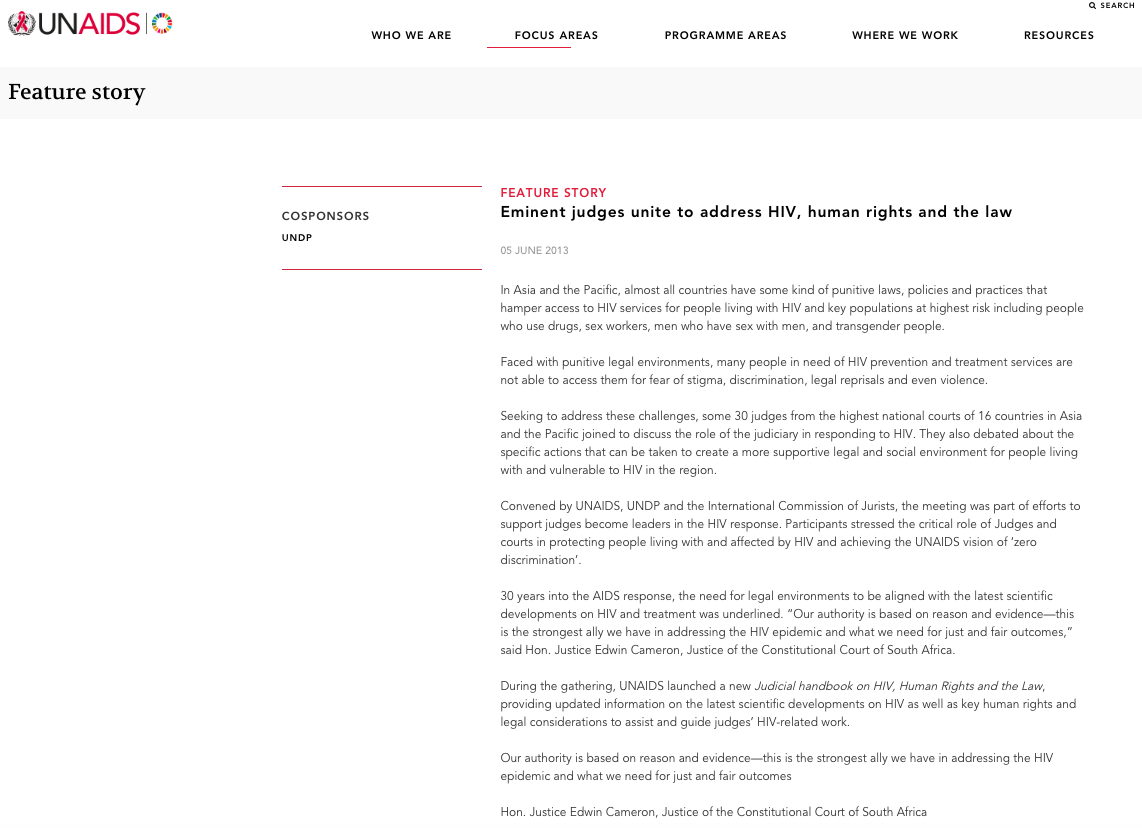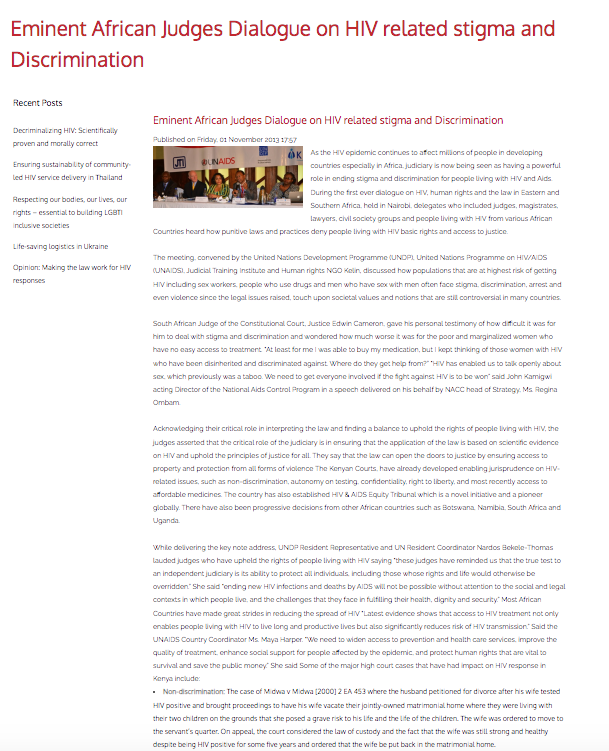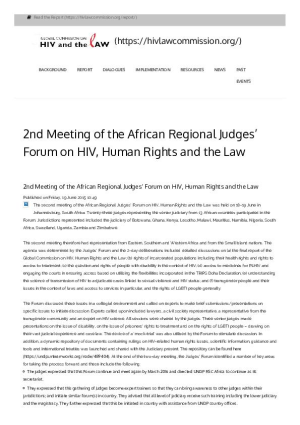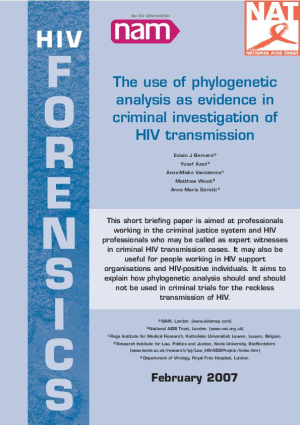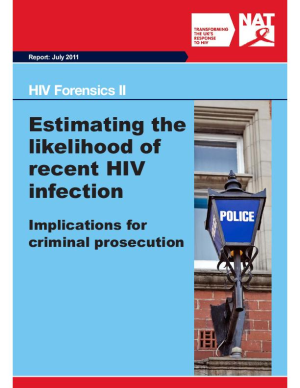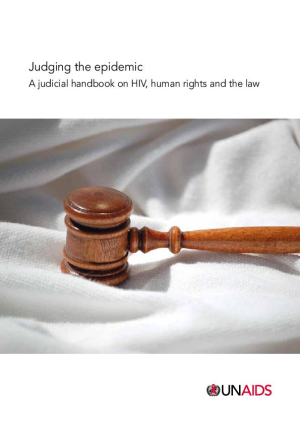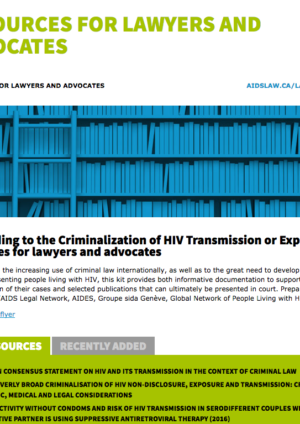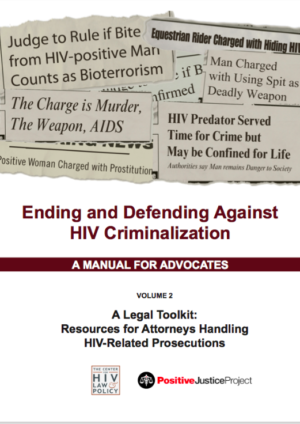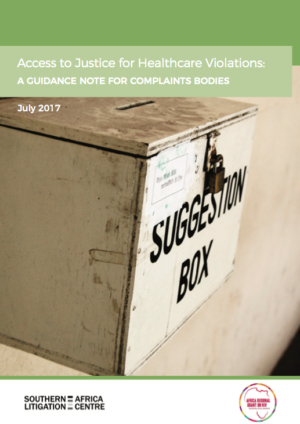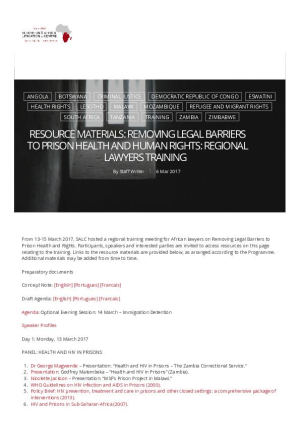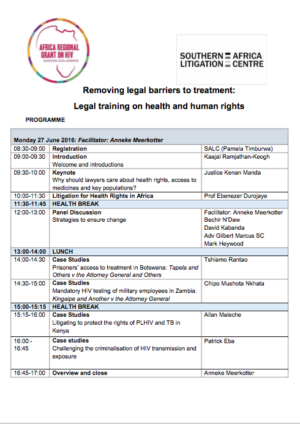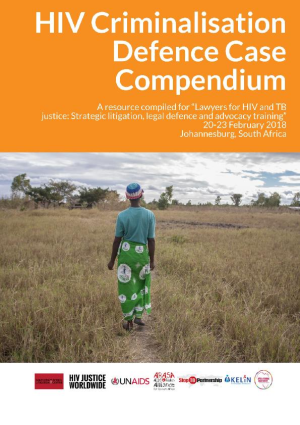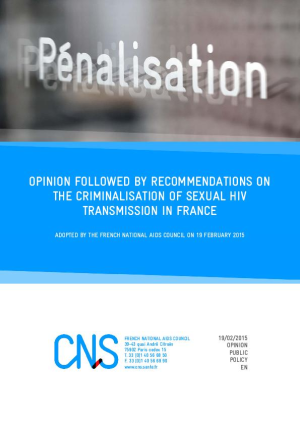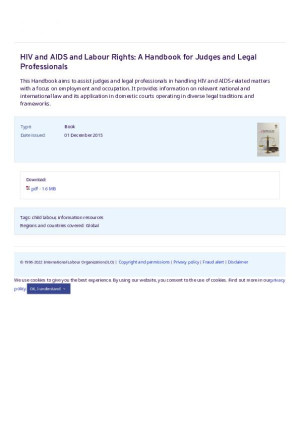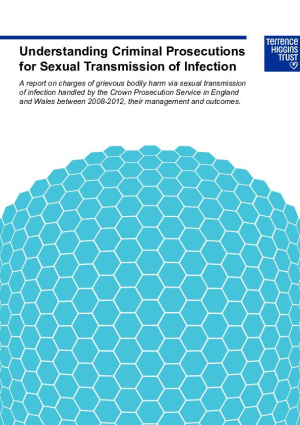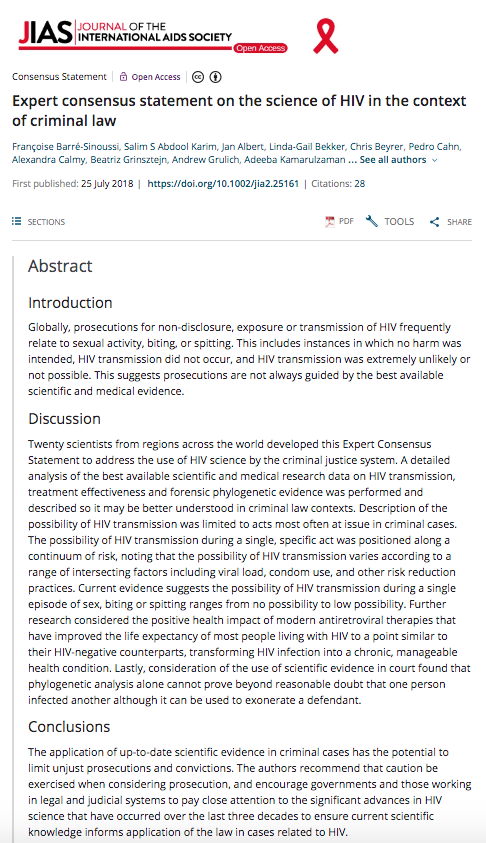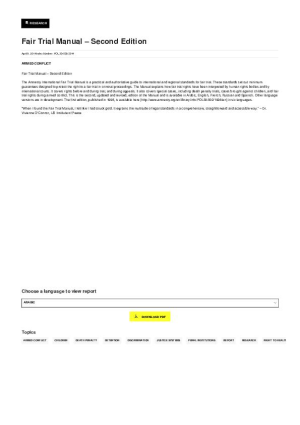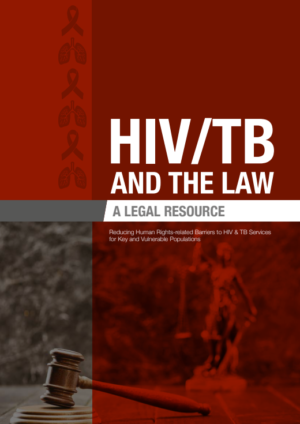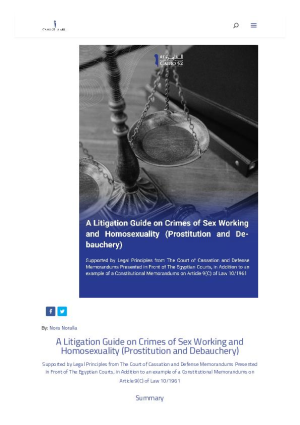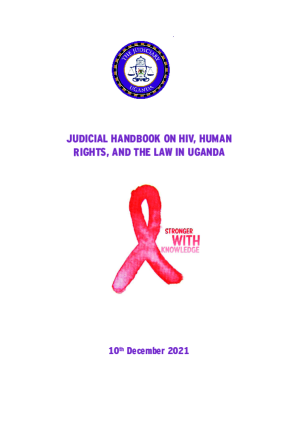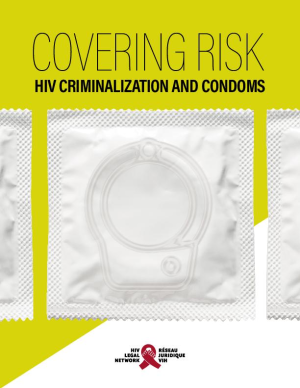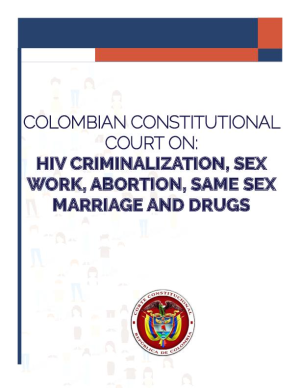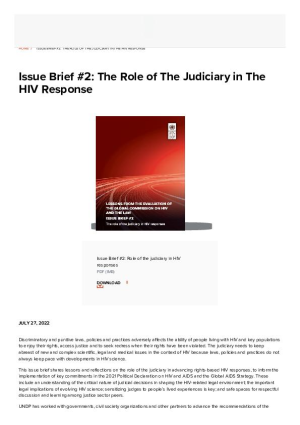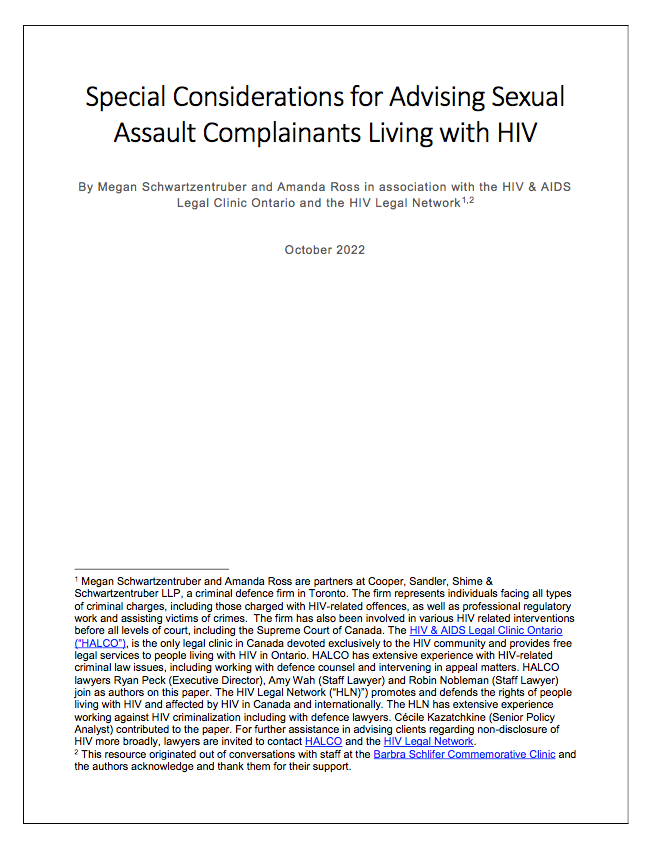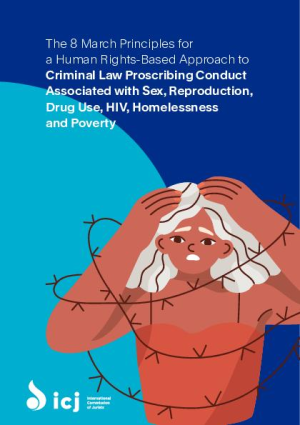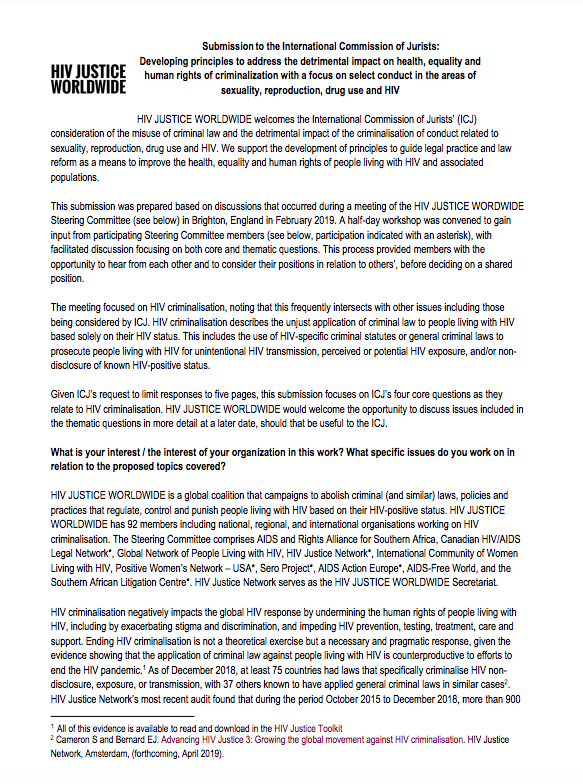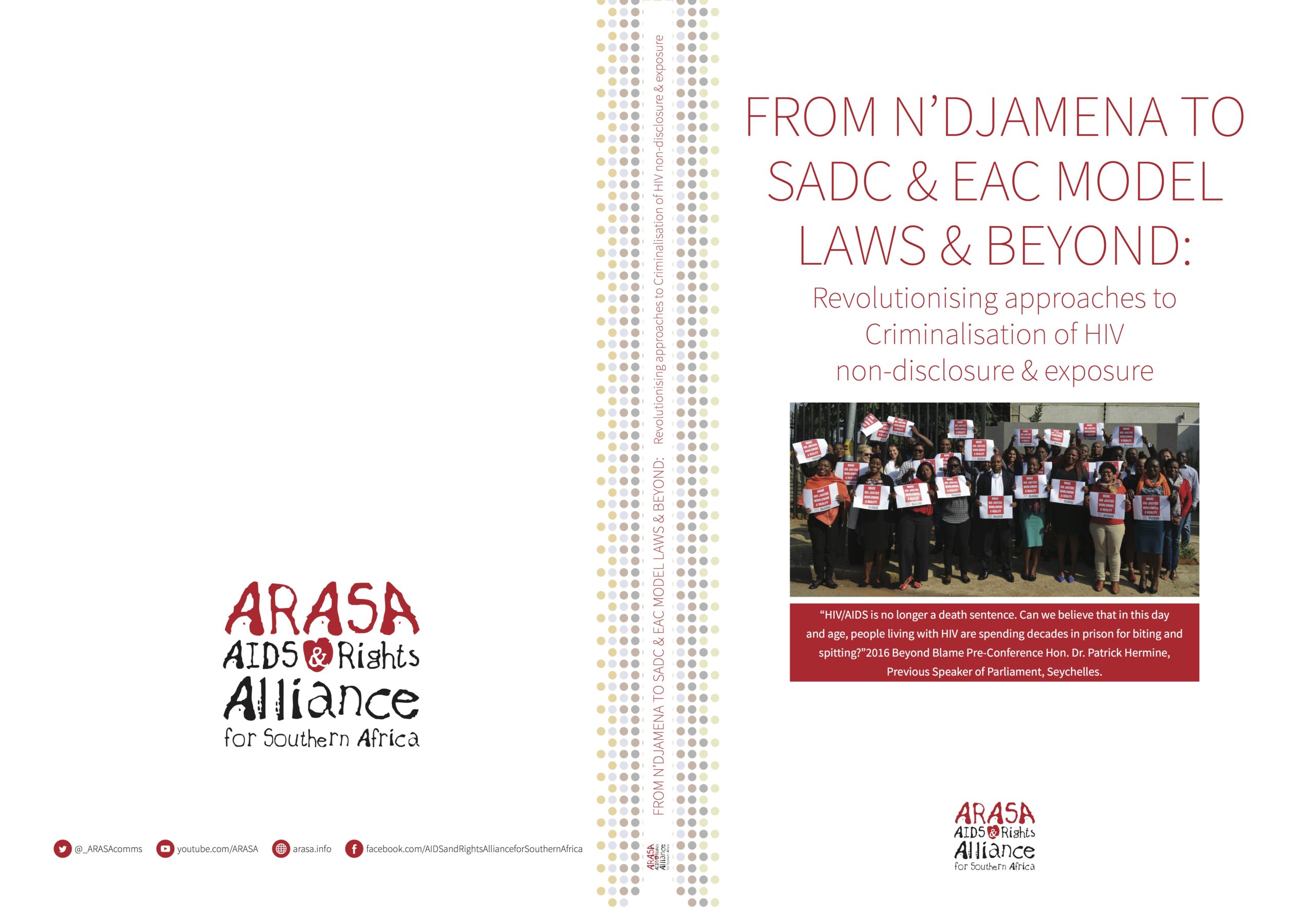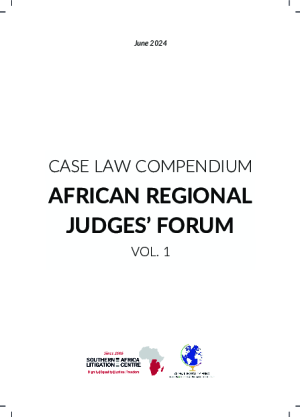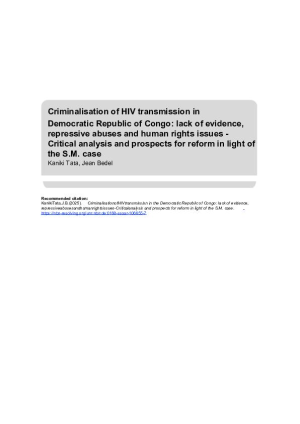Restates UNAIDS’ position on criminalisation and makes specific recommendations to help governments, policy-makers, law enforcement officials, and civil society limit the overly broad application of criminal law to HIV.
Legal education
Resources for lawyers, prosecutors and judges
Criminalization of HIV transmission Policy Brief
Urges governments to limit criminalisation of HIV to cases of intentional transmission. Argues that criminal law should not be applied in a range of circumstances, including where there is no significant risk of transmission.
- Alternative links
- French/Français, Spanish/Español, Russian/Русский
Resolution of the Board of Directors of the National Association of Criminal Defense Lawyers Concerning HIV Criminalization
Opposes laws that base criminal liability and/or penalty on HIV status, rather than intent to harm. Argues that focus on knowledge of status as a key element of an HIV-related crime rather than intent and capacity to transmit the virus, is a classic example of an inadequate mens rea (or criminal intent) requirement and overly expansive criminalization.
Interview with Cynthia Fromstein
Reports interview with Cynthia Fromstein, a Toronto-based criminal lawyer with experience as a defense lawyer in cases regarding HIV non-disclosure. Discusses her experience with laws around HIV disclosure.
Case Law Index
Listing of some U.S. HIV prosecutions by case name (to 2013), (pages 7-9)
Position Paper: The Need for New Charge Assessment Guidelines: HIV Non-Disclosure in British Columbia
Outlines different ways to address HIV non-disclosure: charge assessment guidelines, a public health approach, and prosecutorial guidelines. Provides recommendations.
Inside NACDL: A Lamentable Example of Overcriminalization: HIV Criminalization
Norman L. Reimer, Executive Director of the National Association of Criminal Defense Lawyers, writes about the first U.S. National Prosecutors Roundtable on HIV Criminalization Law and Policy – jointly convened by the Association of Prosecuting Attorneys (APA) and the Center for HIV Law and Policy - noting that the APA will endeavour to develop consensus positions with respect to reform of HIV-related laws.
The Compendium of Judgments, HIV, Human Rights and the Law
Includes judgements from jurisdictions around the world, representing enabling jurisprudence on HIV-related issues, including judgements related to the criminalization of HIV transmission, exposure and non-disclosure.
Eminent judges unite to address HIV, human rights and the law
Describes a meeting of some 30 judges from the highest national courts of 16 countries in Asia and the Pacific to discuss the role of the judiciary in responding to HIV. Judges also debated the specific actions that can be taken to create a more supportive legal and social environment for people living with and vulnerable to HIV in the region.
Eminent African Judges Dialogue on HIV related stigma and Discrimination
Describes the 2 day judicial dialogue of judges from Eastern and Southern Africa held in Naorobi, Kenya. Participants included judges, magistrates, lawyers, civil society organisations and people living with HIV.
2nd Meeting of the African Regional Judges’ Forum on HIV, Human Rights and the Law, 2015
Describes the second meeting of the African Regional Judges' Forum on HIV, Human Rights and the Law was held in Johannesburg, South Africa.
The use of phylogenetic analysis as evidence in criminal investigation of HIV transmission
Aimed at professionals working in the criminal justice system and those who may be called as expert witnesses in criminal trials, the briefing explains how phylogenetic analysis should and should not be used in criminal trials for the reckless transmission of HIV.
HIV Forensics II – Estimating the likelihood of recent HIV infection — implications for criminal prosecution
Considers the validity and meaning of scientific tests (Recent Infection Testing Algorithm) to estimate the likelihood of a recent infection in persons diagnosed as HIV positive in the context of prosecutions for HIV transmission.
Transmission Routes, Viral Loads and Relative Risks: The Science of HIV for Lawyers and Advocates
This document from the Center for HIV Law and Policy, published in 2011, lists articles on a range of background issues relevant to HIV criminalisation (particularly in the U.S.) including HIV as a chronic condition, coverage under the ADAAA, transmission routes and risk, viral load and treatment, and phylogenetic analysis.
Judging the epidemic: A judicial handbook on HIV, human rights and the law
Prepared as a resource to help judges, magistrates, arbitrators and other judicial officers throughout the world adjudicate cases involving HIV-related issues. Based on international legal and human rights standards, the handbook contains examples of decided cases from different jurisdictions, good-practice advice and judicial rulings on HIV-related issues.
Responding to the Criminalization of HIV Transmission or Exposure: Resources for lawyers and advocates
In response to the increasing use of criminal law internationally, as well as to the great need to develop tools for lawyers representing people living with HIV, this kit provides both informative documentation to support lawyers in the preparation of their cases and selected publications that can ultimately be presented in court. Prepared by: Canadian HIV/AIDS Legal Network, AIDES, Groupe sida Genève, Global Network of People Living with HIV (GNP+)
- Alternative links
- French / Français
A Legal Toolkit: Resources for Attorneys Handling HIV-Related Prosecutions
This toolkit produced by the Center for HIV Law and Policy (CHLP) for the Positive Justice Project in 2013, provides multiple resources (including case law, legal analysis and scientific data) for lawyers representing people facing HIV criminalisation, and other advocates.
Access to Justice for Healthcare Violations: A Guidance Note for Complaints Bodies
This Guidance Note aims to provide concrete recommendations to alternative complaints mechanisms on how to provide safe, accessible and effective remedies for vulnerable and key populations who experience health rights violations.
Alternative complaints mechanisms are, for the present purposes, understood as those processes identified to be able to receive and determine complaints relating to health care outside of formal court procedures. These include healthcare regulatory bodies, such as health professions councils and nursing councils; decentralised complaints processes, such as complaints processes within ministries of health or health facility-based complaints mechanisms; and national human rights commissions and ombudspersons.
Removing Legal Barriers to Prison Health and Human Rights: Legal Training for African Lawyers
Between 13-15 March 2017, SALC hosted a regional training meeting for African lawyers on Removing Legal Barriers to Prison Health and Rights. A huge amount of resources relating to the training are contained here. Links to the resource materials are provided, as arranged according to the Programme. Additional materials may be added from time to time.
Removing legal barriers to treatment: Legal training on health and human rights
On 27-29 June 2016, the Southern Africa Litigation Centre (SALC) hosted a regional training meeting for African lawyers on “Removing legal barriers to treatment: Legal training on health and human rights” in Johannesburg, South Africa. A large amount of resources relating to the training can be found here, including judgements relating to HIV criminalisation in Africa.
HIV Criminalisation Defence Case Compendium
This HIV Criminalisation Defence Case Compendium aims to support lawyers acting for those who are alleged to have put others at risk of HIV. Based on research conducted in late 2017, it includes criminal cases from all over the world where strong defence arguments have resulted in an acquittal or reduced penalty for persons living with HIV who have been accused of HIV exposure, non-disclosure or transmission.
The Compendium is not intended to be comprehensive. It has been developed as a resource for a training of lawyers from Africa – “Lawyers for HIV and TB justice: Strategic litigation, legal defence and advocacy training” – held in Johannesburg, South Africa from 20-23 February 2018.
Opinion followed by recommendations on the criminalisation of the sexual transmission of HIV in France
Presents an assessment of the legal, ethical, societal and health issues raised by criminal proceedings brought in France for acts of transmission or exposure to the risk of sexual transmission of HIV.
HIV and AIDS and Labour Rights: A Handbook for Judges and Legal Professionals
"This Handbook aims to assist judges and legal professionals in handling HIV and AIDS-related matters with a focus on employment and occupation. It provides information on relevant national and international law and its application in domestic courts operating in diverse legal traditions and frameworks." ILO
Understanding Criminal Prosecutions for Sexual Transmission of Infection
A report on charges of grievous bodily harm via sexual transmission of infection handled by the Crown Prosecution Service in England and Wales between 2008-2012, their management and outcomes.
Expert consensus statement on the science of HIV in the context of criminal law
Twenty scientists from regions across the world developed this Expert Consensus Statement to address the use of HIV science by the criminal justice system. Description of the possibility of HIV transmission was limited to acts most often at issue in criminal cases. The authors recommend that caution be exercised when considering prosecution, and encourage governments and those working in legal and judicial systems to pay close attention to the significant advances in HIV science that have occurred over the last three decades to ensure current scientific knowledge informs application of the law in cases related to HIV.
- Alternative links
- Czech: Expertní prohlášení k vědeckým poznatkům o HIV v kontextu trestního práva , French: Déclaration de consensus d'experts sur la connaissance scientifique relative au VIH dans le contexte du droit pénal, German: Expertenkonsens zur HIV-Wissenschaft im Kontext des Strafrechts, Mandarin: 專家共識聲明:刑法脈絡下的愛滋相關科學, Russian: Заявление об экспертном консенсусе в отношении научных данных о ВИЧ- инфекции в контексте уголовного права , Spanish: Declaración de Consenso de expertos sobre la ciencia relativa al VIH en el contexto del derecho penal
Fair Trial Manual – Second Edition
This Manual seeks to provide a practical guide to the relevant human rights standards for anyone involved in examining how well a criminal trial or a justice system meets international standards of fairness. It is intended for the use of trial observers and others assessing the fairness of an individual case, as well as for anyone seeking to evaluate the extent to which a country’s criminal justice system guarantees respect for international standards of fair trial. It may also serve as a guide for law makers, judges, prosecutors and defence lawyers or as a training tool.
Reducing Human Rights Related Barriers to HIV & TB Services for Key and Vulnerable Populations: Legal Support Resource
The legal support resource is part of an on -going human rights programme with the goal of reaching key and vulnerable populations by utilising customised and targeted interventions. These interventions include activities on (1) legal empowerment;(2) training of paralegals on issues related to HIV, TB and human rights; (3) legal and paralegal support to community members whose human rights have been violated including pursuing identified matters to court; and (4) sensitisation of judiciary, law makers and traditional leadership especially those involved in traditional courts.
It gives practical information on current and evolving legislation, common law and policies pertaining to HIV and TB in South Africa. The aim is to educate, sensitise and provide updated information to paralegal and legal practitioners alike, who are engaged in offering legal advice and services to individuals and communities who serve members of the vulnerable and key populations.
A Litigation Guide on Crimes of Sex Working and Homosexuality
This an English Summary of the book “A Litigation Guide on Crimes of Sex Working and Homosexuality (Prostitution and Debauchery) “. The book aims to provide a litigation guide and a legal overview of principles and procedures to legal advocates and whoever wishes to know more about “prostitution” or “debauchery” crimes under Egyptian law.
Judicial Handbook on HIV, Human Rights and the Law in Uganda
The Judicial Handbook on HIV, Human Rights and the Law in Uganda comprises of five parts that address the issues relating to HIV/AIDS and raises pertinent issues relating to its existence as may affect Judges’ decisions as well as possible recommendations for a start. Specifically, it has a background in which the current status of the HIV/AIDS epidemic and response to it is included.
- Part I enunciates the International Law and Human Rights Frameworks as applicable to HIV/AIDS in Uganda
- Part II concentrates on the National Law and Human Rights Frameworks as applicable to HIV in Uganda.
- Part III is about gaps/issues/shortfalls in national law and human rights frameworks as applicable to HIV and discusses policies on HIV.
- Part IV pertains to criminalization of transmission of HIV and its adverse effects.
- Part V is about things to remember when judging and adjudicating HIV cases, what the disposition of a judicial officer should be as well as the role of a judicial officer in the courtroom whilst handling such cases.
Covering Risk: HIV Criminalization and Condoms
While some policymakers and courts have recognized condom use as sufficient to negate possibility of HIV transmission, people living with HIV in Canada remain at risk of prosecution for alleged non-disclosure before sex with a condom. While the law may be unsettled, the science and policy reasons are clear: prosecuting people living with HIV who use condoms is unscientific and unfair. Law- and policymakers must act to definitively preclude prosecutions against people living with HIV who use condoms.
Colombian Constitutional Court on: HIV Criminalization, Sex Work, Abortion, Same Sex Marriage and Drugs
This document presents some of the most relevant and recent decisions in which the Court has discussed the limits to individual liberty, autonomy and privacy among issues concerning matters like: (i) HIV criminalization and other protections; (ii) sex work; (iii) abortion or voluntary interruption of pregnancy; (iv) rights of same sex couples to marriage; and, (v) personal drug possession and consumption.
Issue Brief #2: The Role of The Judiciary in The HIV Response
This issue brief shares lessons and reflections on the role of the judiciary in advancing rights-based HIV responses, to inform the implementation of key commitments in the 2021 Political Declaration on HIV and AIDS and the Global AIDS Strategy. These include an understanding of the critical nature of judicial decisions in shaping the HIV-related legal environment; the important legal implications of evolving HIV science; sensitizing judges to people’s lived experiences is key; and safe spaces for respectful discussion and learning among justice sector peers.
Special considerations for advising sexual assault complainants living with HIV
This paper is devoted to issues faced by a group of individuals with a unique experience: sexual assault complainants living with HIV who could potentially be transformed from complainants to accused persons. In particular, this paper will discuss some of the factors that arise in these situations and aims to provide some guidance on the advice lawyers can provide to sexual assault complainants living with HIV to assist them in navigating these potentially complex situations.
8 March Principles for a Human Rights-Based Approach to Criminal Law Proscribing Conduct Associated with Sex, Reproduction, Drug Use, HIV, Homelessness and Poverty
The Principles, published by the International Commission of Jurists are based on general principles of criminal law and international human rights law and standards. They seek to offer a clear, accessible and workable legal framework – as well as practical legal guidance – on applying the criminal law to conduct associated with: sexual and reproductive health and rights, consensual sexual activities, gender identity and expression, HIV non-disclosure, exposure or transmission, drug use and homelessness and poverty. The principles are additionally intended to address the detrimental impact of the criminalization of this conduct on health, equality and other human rights.
Submission to the International Commission of Jurists: Developing principles to address the detrimental impact on health, equality and human rights of criminalization with a focus on select conduct in the areas of sexuality, reproduction, drug use and HIV
This submission was prepared based on discussions that occurred during a meeting of the HIV JUSTICE WORDWIDE Steering Committee. The meeting focused on HIV criminalisation, noting that this frequently intersects with other issues including those being considered by ICJ.
From N’Djamena to SADC & EAC Model Laws and Beyond: Revolutionising approaches to Criminalisation of HIV non-disclosure & exposure
ARASA in collaboration with the HIV Justice Worldwide (HJWW) Consortium, convened a two-day meeting involving policy and law makers, members of the judiciary, lawyers, parliamentarians and representatives from civil society organisations from the East African, SADC regions and global North to revisit alternative approaches towards criminalisation and to accelerate a sustained momentum, strengthen collective action.
Case Law Compendium African Regional Judges Forum Vol. 1
Part I includes summaries of precedential human rights rulings from across the continent, ranging from the right to health to equality, civic rights, criminal justice, and environmental rights.
Part II provides key excerpts from cases showing the care and diligence judges in the region have applied in their reasoning. The excerpts are indicative of constitutional interpretation that respects the universality of human rights in a context where States are trying to step away from the shackles of colonial laws and policing practices.
Criminalisation of HIV transmission in the Democratic Republic of Congo: lack of evidence, repressive abuses and human rights issues – Critical analysis and prospects for reform in light of the S.M. case
This article offers a critical and in-depth analysis of the legal framework governing the criminalisation of HIV transmission in the Democratic Republic of Congo, using the S. M. case as a starting point for broader reflection. This emblematic case highlights the excesses of a justice system that is still too often influenced by fear, prejudice and stigmatisation of people living with HIV, to the detriment of the required standards of scientific evidence. Through a rigorous examination of this decision, the article reveals the systemic flaws and repressive excesses that still characterise the Congolese justice system, where HIV-positive status is often wrongly equated with automatic proof of guilt, particularly when it is invoked in proceedings related to sexual violence. Far from limiting itself to denunciation, this study takes a resolutely constructive perspective by calling for a thorough reform of the legal treatment of cases of alleged HIV transmission. It highlights the urgent need to develop clear guidelines for magistrates, to strengthen the training of justice professionals on the biomedical realities of HIV, and to promote a coherent approach that reconciles the fight against sexual violence, respect for human rights and public health requirements.


